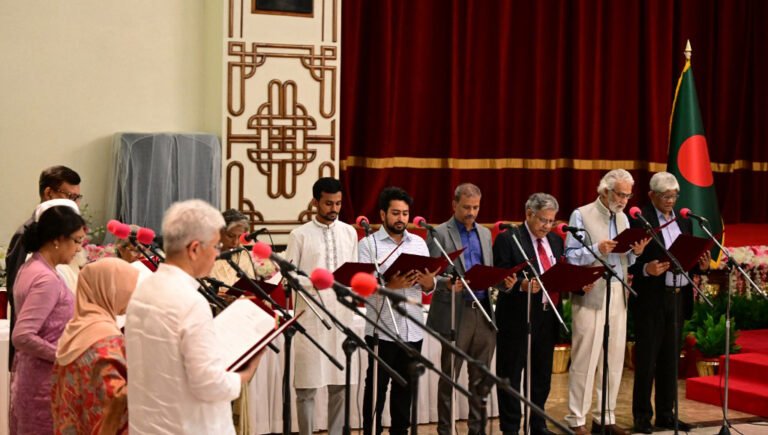Six months into the tenure of Bangladesh’s interim government, led by Nobel laureate Dr Muhammad Yunus, the country finds itself at a crossroads. What started as a moment of hope—a chance to break free from the chains of authoritarian rule—has increasingly turned into a struggle for meaningful reform. While the government has made strides in establishing reform commissions and investigating past human rights abuses, the promises of democracy, stability, and prosperity remain unfulfilled. In this critical moment, it is time to ask: can the interim government truly deliver, or will it fall victim to the same pitfalls that have plagued Bangladesh’s political system for decades?
The government came to power with lofty promises of change, yet six months later, much of that optimism has begun to fade. While some proposed reforms including limits on the prime minister’s tenure and a bicameral parliament could pave the way for stronger democratic institutions, these reforms are yet to materialise. Besides, the public is growing frustrated because of the lack of a clear roadmap for the future.
The greatest test for the interim government remains the economy. With inflation continuing to rise and essential goods becoming increasingly unaffordable, many Bangladeshis are questioning whether the government truly has a handle on the economic crisis. Despite some signs of stabilisation in certain sectors, the majority of the population still feels the weight of economic hardship. The absence of real relief for the people, coupled with continued market manipulation by syndicates, has only deepened the distrust in the government’s ability to address the crisis. Moreover, imposing VAT on some goods and services added salt to the wounds, further burdening ordinary citizens who are already struggling to make ends meet.
Political instability remains another pressing issue. The question of when the next general election will take place has become a political flashpoint. Dr Yunus’s suggestion of holding elections between late 2025 and early 2026 may seem reasonable from a reform standpoint, but the opposition—led by the Bangladesh Nationalist Party—demands a vote by mid-2025. With no clear consensus on the election timeline, political uncertainty continues to fester. Moreover, allegations of government favouritism towards certain political groups have only deepened divisions, raising concerns about the neutrality of the administration.
If the interim government is to survive, it must address these challenges head-on. The lack of a concrete election roadmap is a major source of instability, and it must be resolved as quickly as possible. Similarly, the government must take decisive action to stabilise the economy, curb inflation, and rein in market manipulation. These are not easy tasks, but they are necessary for the long-term health of the country.
Equally pressing is the issue of law and order. The reluctance of the police force to take action, fuelled by fear of retaliation for their role in suppressing the July-August protests, has left a dangerous security vacuum. Crime and mob violence are on the rise, and the public is losing confidence in the ability of law enforcement to protect them. The government must take immediate steps to restore law and order, ensuring that the police are held accountable while also protecting the rights of the people.
However, perhaps the most daunting challenge the interim government faces lies within its own bureaucracy. Bangladesh’s bureaucratic system is notorious for inefficiency, corruption, and an ingrained culture of authoritarianism. These issues are not easily addressed, and the government’s struggle to reform the civil service is becoming increasingly apparent. The red tape and lack of accountability in public sector have often hindered progress on numerous fronts.
Despite the government’s call for reform, many citizens still find themselves entangled in a web of bureaucracy that stifles action and delays change. Long-standing issues such as corruption, inefficiency, and the disregard for citizens’ rights persist within the civil service. Public servants often prioritise loyalty to political figures over their duty to the people, and many bureaucrats seem more focused on maintaining the status quo than implementing much-needed reforms. The situation has become so dire that even simple requests for services often result in frustration, delays, and, at times, exploitation.
The reform of this bureaucratic system is crucial if Bangladesh is to break free from its cycle of inefficiency and corruption. However, the government has been slow to tackle these deep-rooted problems. The failure to reform the civil service is not just an administrative issue—it’s a political one. Without addressing these systemic issues, the government will continue to be undermined by the very institutions it seeks to change. Reforming the bureaucracy is not a matter of tinkering with policies; it requires a fundamental shift in the culture and operations of the civil service.
Finally, the government must confront the spectre of past crimes and human rights abuses. The previous regime, led by the Awami League, is guilty of numerous atrocities, and many of its members have yet to be held accountable. The investigation process has been slow, and many ask whether those responsible will ever face justice. The interim government must ensure the judicial process remains independent and transparent, allowing for true accountability without political interference.
The time for empty promises and political gamesmanship is over. If the interim government is to succeed, it must act swiftly and decisively. The people of Bangladesh deserve a government that will put their needs first, not one that is bogged down by bureaucracy, political favouritism, and economic mismanagement. True reform will require more than just words—it will require action, accountability, and a clear vision for the future.
In the coming months, the government will face a crucial test: can it overcome the challenges that have plagued Bangladesh’s political system for so long, or will it become just another failed experiment in transitional rule? The answer will determine not only the future of this government but the future of Bangladesh itself.



